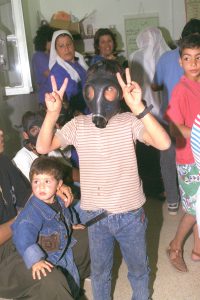Author: Asaf Hazut
“War is a continuation of policy by other means.” (1)
This concept was proposed by Prussian general and military theorist Carl Philipp von Clausewitz[1], who lived in the 18th century and knew full well that war serves no purpose in and of itself, and is only part of a long and exhausting process of political negotiations.
What was true then is doubly true today. But today wars have become more technological, more media-heavy, with different layers of violence including violence in cyberspace, ideological violence, and psychological violence. Unfortunately, the conditions of devastated cities in Ukraine indicate that even physical violence plays a part in modern warfare.
Warfare using weapons of mass destruction has also been part of this process of violence. The use of chemical weapons sought to bring about quick and quiet victories, which consequently produced less physical damage. Currently, such activity can be interpreted as being more legitimate.
Strange as it may seem, the best way to prevent the use of chemical weapons is either of the two following methods:
>> Producing an equal balance of threat as a counterweight to enemy attack.
>> Protecting oneself, thus reducing the future damage this type of weapon can cause.
The first method of prevention is regulated through international conventions such as the CWC, which has even created a mechanism for supervising and controlling the production and development processes of chemical weapons, such as the OPCW. I would like to note with great sorrow that events in recent years indicate these processes are only effective to a limited extent.
According to the UN Commission of Inquiry, Syria has used chlorine and sarin gas in an attack on the city of Irbid in August 2013, and in many other instances. According to reports from US and British intelligence agencies, Russia is preparing the means to use similar weapons in the process of taking over major cities in Ukraine. These two are sufficient to attest that the Eastern Doctrine recognizes the use of chemical weapons as a legitimate means of achieving their policy objectives.
The second method of preventing the use of chemical weapons concerns the defending party’s ability to protect itself, and thus reduce the military and political achievements associated with such an attack.

Chemical weapons are known for their capacity to cause numerous casualties, injuries and deaths on a large scale. It can especially throw the attacked party out of balance and force it to reduce its ability to fortify dense defense arrays. Using protective equipment will allow the defender to remain within their defensive arrays, thwarting the attacker’s desire to advance.
Under these conditions, the attacked area will become restricted in the movement for the attacker, and not for the defender.
The protection of the population also allows the defender to make informed decisions about evacuation and defense processes for areas under attack. The decision to protect the Israeli population against chemical weapons in 1990 was one of the factors that prevented the use of chemical weapons in missiles fired into its territory in 1991 by Saddam Hussein, then-ruler of Iraq.
The act of defense produces a different balance of power. The fact that the potential damage to the attacked party is low forces the attacker to consider the disadvantages of using chemical weapons as a reason to avoid using such weapons in the first place. Public and international condemnation, together with the reduction in the capacity for military success, creates a balance of power that is nonviolent but makes it possible to balance the attacking and attacked parties, a balance that can prevent the use of chemical weapons.

The crucial conclusion is: defensive capabilities, both civilian and military, can and should be available to the defender despite not being offensive in nature. The goal of reducing the attacker’s desire to use chemical weapons, along with other components, creates a balance of power between the indiscriminate attacker and the defender.
[1] Carl Philipp Gottfried von Clausewitz (June 1780 - November 16 1831) was a Prussian military man, one of the forefathers of modern military theory, who first brought up the subject of the psychological and political elements of war
Contact Mr. Asaf Hazut at:
Salesg@impertechsafety.com